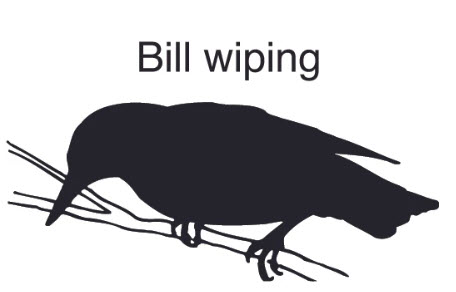I noticed that my male canary was wiping his bill frequently in the presence of a female I introduced him to, and it got me wondering….
QUESTION: Why do birds wipe their bills?
ANSWER: Birds probably wipe their bills for a variety of reasons. But let’s start with what counts as bill wiping. Here’s a technical description:
“rapid withdrawal of the side of the beak from base to tip closely adjacent to a foreign surface such as a branch or the ground.” (Clark, 1979)

Birds often wipe both sides of their beaks, alternating. The number of wipes per session varies – a Double-barred finch was seen doing it 90 times in a few minutes (Morris 1957b). The beak may be open or closed, and may or may not actually touch another object.
Since bill-wiping uses energy, it probably serves some kind of purpose. It’s different from preening (where the bird uses its beak to fluff/arrange/clean/groom its feathers.) Here are some possible drivers:
- Hygiene: A bird may wipe its bill to clean it after eating something messy, like suet, a juicy berry, or a sticky insect. You might see them do this right after eating, bathing, drinking, or manipulating something in their bill.
- Yuckiness: A bird may wipe it’s bill after coming into contact with something distasteful.
- Displacement: Maybe it’s a form of fidgeting in response to anxiety, frustration or feeling conflicted. It could be an agonistic (combative) behavior in response to a sense of conflict, like another bird or person coming into their “space.”
- Power Move: A dominant bird may bill-wipe in the presence of a subordinate bird, as a sign of aggression, or in defense of its territory. It’s a form of communication.
- Sexual: Bill-wiping is often seen during courtship. A male may bill-wipe in the presence of a female.
- Prelude to singing: Some birds might bill-wipe right before breaking out into song
- Honing: Some birds like parrots will scrape their beaks on rough/abrasive surfaces like bark, to shape or file their bills. Bird beaks have a fleshy covering over the bone that is made of ever-growing keratin, like human fingernails, and wiping it may wear it down.
- Chemical defense/attractant?: There is speculation that White-breasted nuthatches may do a sweeping bill-wipe to somehow deter predators from their nest area. Red-breasted nuthatches have been observed wiping pine sap along the entrance to a nest cavity – it’s stickiness may fend off invaders. If a bird first wipes it’s bill on an oil gland (used to maintain and waterproof feathers) and then wipes it on an object, perhaps the intent is to leave a scent behind.
Sources:
- Avian Bill-Wiping, George A Clark, Jr, The Wilson Bulletin, September 1989, Vol.82,no.3, pp 279-288.
- Beaks and Bills, ornithology.com
- Here’s Why Birds Rub Their Beaks on Stuff, Andy McGlashen, Audubon Magazine, May 1, 2019.
- The Function of Bill-Wiping, Cuthill, Innes et al, Animal Behavior, Vol.43, Issue 1, January 1992, pp 103-115
More Information:
If you ask me “why,” I will either tell you what I think or tell you a lie – we usually can’t answer why.
– Keanna Leonard, Rowe Sanctuary, Kearney, NE
